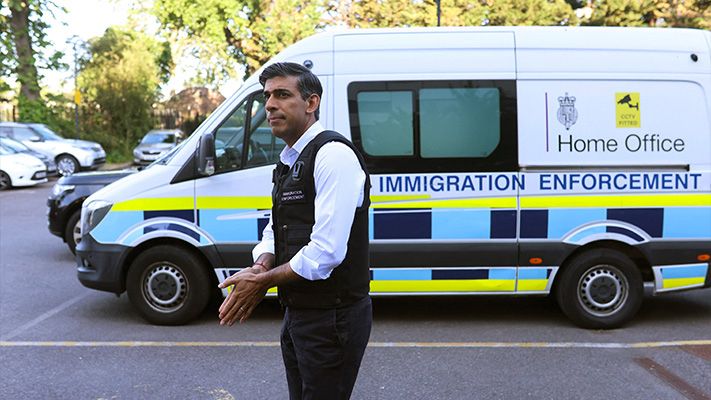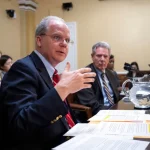
NORWICH, United Kingdom — British Prime Minister Rishi Sunak has declared a general election to be held on July 4. On May 22, a wet Wednesday afternoon, Sunak stood by himself at a lectern and revealed the date while addressing the country outside Downing Street. The Labour Party anthem, “Things Can Only Get Better,” erupted from a nearby street as he pleaded with the people to back him.
As his words were drowned out, so was his suit, going from wet to saturated in about six minutes. From an optics perspective, it was not the most auspicious moment to hold a press briefing and open an election campaign. However, it goes beyond merely a junior civil servant’s inability to bring him an umbrella.

It is symptomatic of a key policy problem, regarding immigration to Great Britain. It has been getting worse in recent years and could cost Sunak and his ruling Conservative Party their hold on power just as, across the pond, Americans bust open beer bottles, grill hot dogs, and watch fireworks on Independence Day in the United States.
The day after Sunak’s weather-challenged news conference, the Office for National Statistics released the annual net migration figures, which effectively made Conservatives seem like the party of open borders — a charge its members frequently fling at Labour rivals. Government figures show 672,000 people entered the country between June 2022 and July 2023, a figure that could still be revised upward. Net migration has increased the number of people living in the United Kingdom by 3.7 million since Conservatives took power in 2010 — more than the population of Wales.
The average annual net migration during the 1997–2010 New Labour years was roughly 200,000. Given that the prime minister’s party has tripled the number arriving, it is a little ironic that he has little moral authority to chide his political opponents on the matter.
Immigration debates in the run-up to the snap election come as a vast majority of British citizens want immigration reduced. With competition for resources already stretched, it is increasing demand for an already scarce supply of housing.
A policy exchange report estimates that the annual cost of housing migrants in hotels for a year comes to roughly £2.2 billion ($2.8 billion) — more than three times the £630 million ($802 million) allocated annually to eliminate homelessness. The National Health Service is under further strain because of this as well — the waiting list has reached a record-breaking high of 7.5 million people.
For several years, the government model for dispersing migrants has seen them relocated to the most impoverished parts of the country, including many deprived northern English towns starved of council funding. Working-class communities bear the brunt of immigration, leading to a breakdown in social cohesion.
Consequently, the electorate, which leans conservative, is growing increasingly disenchanted with the party. Meanwhile, Sunak has some of the lowest approval ratings of any prime minister since records began.
Some of Sunak’s problems have been present from the start. When Sunak was running for the Conservative Party leadership, he was asked if someone with personal wealth — he is married to Akshata Murty, a fashion designer and billionaire’s daughter — could relate to the average voter. The pair’s combined net worth is £651 million ($829 million). He assertively said, “Judge me on my record, not my wealth,” on the Today program. But skepticism remains among the electorate.
On the policy front, Sunak has pushed a series that isn’t particularly conservative. The self-proclaimed Party of Liberty has sought to implement a smoking ban that would prevent anyone born after 2008 from legally buying tobacco and restrict the variety of e-cigarette products retailers can sell by either banning them or taxing them to the point of obsolescence. The Conservatives seem to despise the younger generation actively.
Additional proof of this can be found in the recently proposed plans to reinstate national service for all 18-year-olds and implement a triple lock plus tax break, which shields pensioners from a fiscal drag on income tax. The Reform UK party, a center-right neoliberal startup now led by the irrepressible Nigel Farage, a prominent trans-Atlantic booster of former President Donald Trump, is luring older voters away from the traditional Conservative Party. Sunak’s capitulation to the grey vote is a desperate attempt to appease these voters, who are frequently said to become more conservative with age.
Young people are fed up. During COVID-19, the Tories imprisoned them in their homes and gave the police orders to arrest them for gathering “illegally” outside, which seriously damaged their education. Their future was mortgaged to finance the population’s economic security, which was brought about by an exaggerated and mostly false sense of security. As a result, they left behind a debt that their grandchildren will have to pay off — offering a legacy of zero growth, decimated businesses, and the highest tax burden since World War II to pay off enormous debt. While smuggling suitcases full of champagne into Westminster, they lectured the youth about duty and responsibility.
Tory MPs face a real-life Sophie’s Choice as polls point to a Labour landslide. If data are to be believed, the election represents a coin flip between an existential threat (retaining about 50 MPs) and a survivable one (200 MPs or so out of 344 retain their seat). For context, following Tony Blair’s historic Labour Party victory in 1997, the Conservatives won 165 seats. To win an absolute majority, 350 seats are needed.
CLICK HERE TO READ MORE FROM THE WASHINGTON EXAMINER
The Conservatives talk big on issue after issue to hide their lack of actual policy depth on policies that the public finds important and cares about. To put it plainly, the country has simply stopped paying attention to the Conservatives after 14 years of broken promises.
Perhaps they’ve just become complacent because they’ve held power for too long. It took New Labour 13 years to devastate the nation completely, which undoubtedly sowed the seeds for many of the immigration and identity politics problems we face today. Maybe spending a few years on the opposing benches will help them. They will have more time to figure out who they are and what they genuinely believe in.
Noel Yaxley’s work has appeared in the Critic, City Journal, and Compact.





